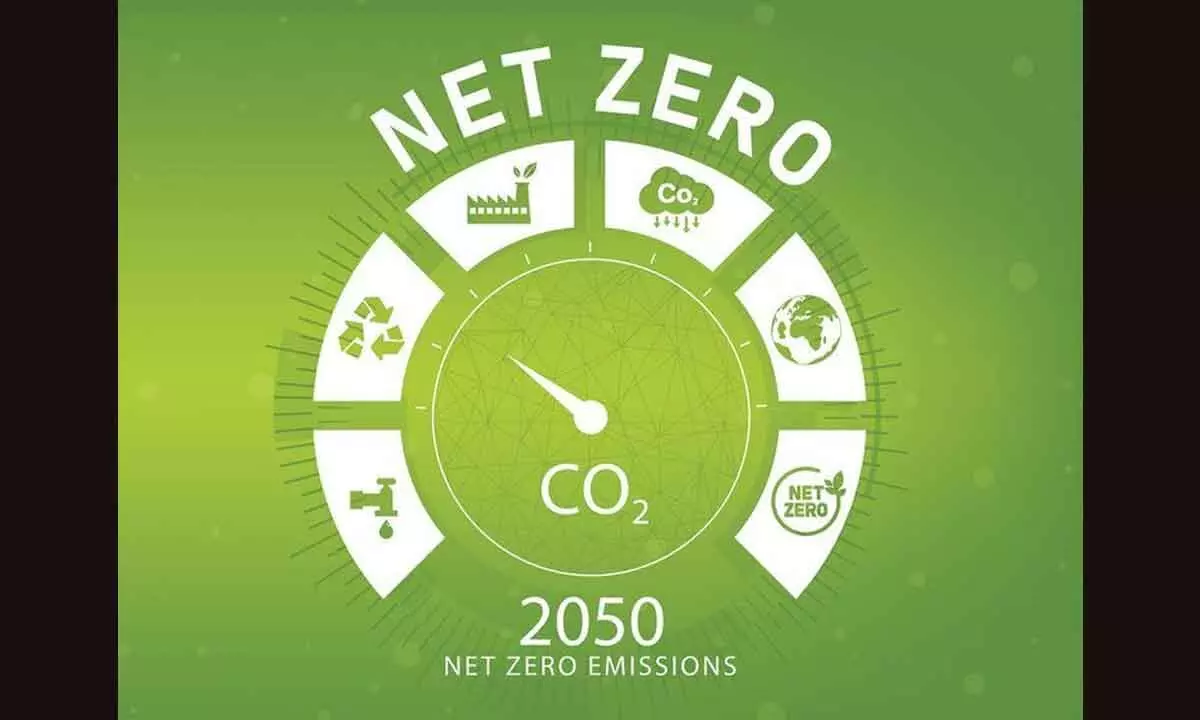The Middle East gears up for Net Zero
The global production capacity for Sustainable Aviation Fuel has to exceed 30 billion litres by 2030
image for illustrative purpose

The aviation industry contributes approximately two to three per cent of all global CO2 emissions but with a constant increase in passenger demand, this could rise to 25% to 30% by 2050 if no actions are taken, according to a new report by Frost & Sullivan titled ‘Sustainable Technologies in Aviation’, which raises the urgency on manufacturers, airlines and airport operators to undertake sustainability initiatives
As the aerospace and defence industries continue on their respective pathways to net zero, this year’s Dubai Airshow will be the ultimate platform for players from across these industries to converge and showcase the latest solutions that will help advance these crucial economic sectors towards a sustainable future.
The aviation industry contributes approximately two to three per cent of all global CO2 emissions but with a constant increase in passenger demand, this could rise to 25% to 30% by 2050 if no actions are taken, according to a new report by Frost & Sullivan titled ‘Sustainable Technologies in Aviation’, which raises the urgency on manufacturers, airlines and airport operators to undertake sustainability initiatives.
Additionally, global production capacity for Sustainable Aviation Fuel (SAF) needs to exceed 30 billion litres by 2030 and 450 billion litres by 2050 for airlines to be able to achieve net zero targets. In 2020, SAF production was just 450 million litres, according to IATA, which is less than 0.05% of the global demand for jet fuel.
Meanwhile, several initiatives are underway in the Middle East region. Recently, Abu Dhabi Future Energy Company (Masdar) signed an agreement with Airbus to support the development and growth of the global SAF market. The agreement will also see the entities collaborate on Green Hydrogen, and Direct Air Capture technologies. Qatar Airways signed a deal with Shell to source 3,000 metric tonnes of neat SAF at Amsterdam Schiphol airport, making it the first carrier in the Middle East and Africa to procure a large SAF amount in Europe, beyond government SAF mandates.
Globally, Shell Aviation has signed several other agreements to provide airlines, including JetBlue and Japan Airlines (JAL), with SAF, and Air bp, the specialised aviation division of multinational oil and gas company BP, has announced the first sale of SAF from its Castellon refinery in Spain, marking another milestone as it works towards making SAF more available.
Earlier this year, Emirates successfully completed a demonstration flight powered by 100% SAF on a Boeing 777-300ER, as part of its plans to help the global aviation industry meet carbon emission targets. The airline has also earmarked $200 million to fund R&D on advanced fuel technologies that can reduce commercial aviation's environmental impact.
Mikail Houari, President, Africa and Middle East at Airbus, commented: “At Airbus, we continue to demonstrate our unwavering commitment to leading the decarbonisation journey in the aerospace industry through our pioneering role in developing disruptive technologies. Whether this is through hydrogen-powered commercial aircraft or other sustainable solutions when it comes to engines and fuels, our goals are a testament to the potential for revolutionising the way we fly. We are relentlessly pursuing ambitions of building a more sustainable future for aviation as we seek to make our commercial fleet capable of flying with 100% SAF by 2030.”
Separately, Honeywell has launched a new technology called UOP eFining™ that produces lower-carbon aviation fuel from green hydrogen and carbon dioxide captured from industry.
Mohammed Mohaisen, president and CEO, Honeywell Middle East and North Africa, commented; “Sustainable Aviation Fuel represents a ready now opportunity to drive the sustainable growth of the aviation industry, yet it is still barely tapped into. Technologies that can harness readily abundant CO2 to produce SAF are transformational in terms of how we fuel aircraft, and will play an important role in the long-term decarbonization of the sector. That is why we recently added UOP eFining™ to our existing Ecofining and ethanol-to-jet fuel portfolio, offering customers multiple pathways to SAF production through proven technology, and helping them meet the rapidly growing demand for renewable fuels today."
Kuljit Ghata-Aura, President, Boeing Middle East, Türkiye and Africa, commented: “Boeing is very proud to be participating in the Dubai Airshow again, and we are especially pleased to be the sponsor of the Aerospace 2050 conference. The aviation industry is committed to achieving net zero carbon emissions by 2050, and Boeing is actively developing airplanes and technologies which will enable our airline customers to meet these goals. We look forward to sharing our experience and engaging with our industry peers and partners at Dubai Airshow 2023.”
The sustainability conference, with sponsors including Air BP, Shell Aviation and Asia-Pacific Space Cooperation Organization (APSCO), will focus on key topics for 2023, including hydrogen-powered aviation, SAF, COP28 predictions, efficient engines, streaming operations, and hybrid and electric aircraft. It will also address on how best to prepare for carbon-neutral passengers of the future and creating a low-carbon aviation energy hub through global leadership.

